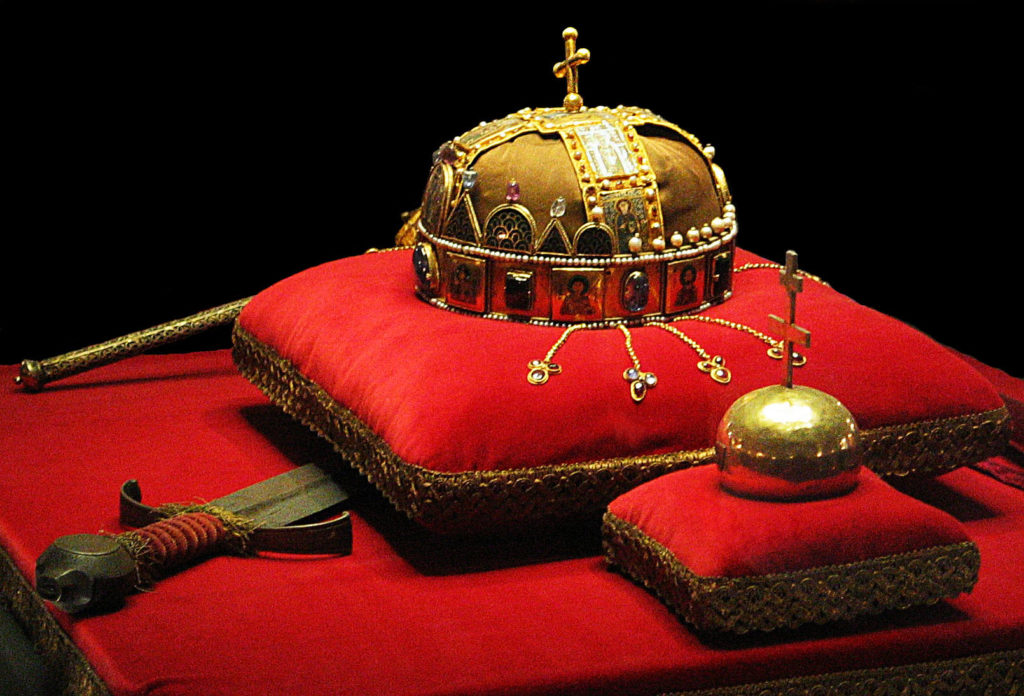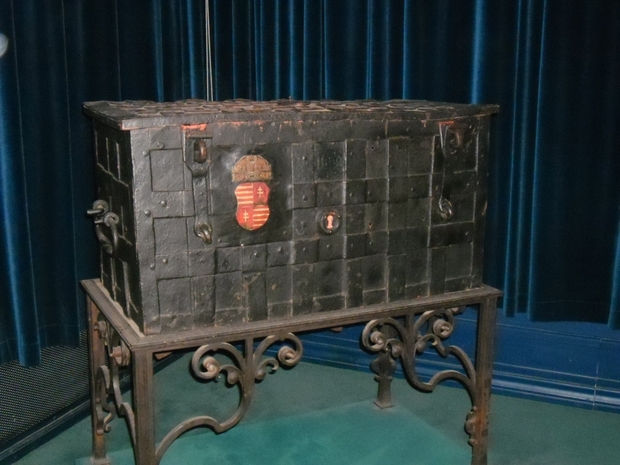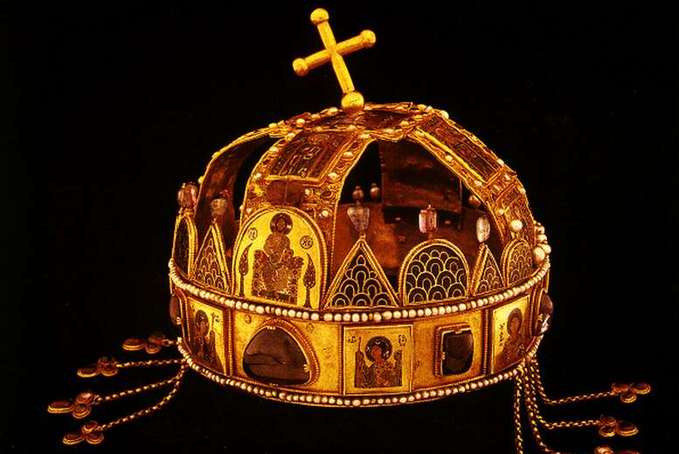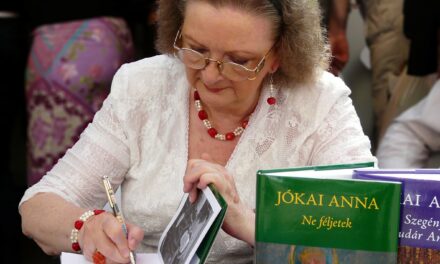It is worth quoting the XXV. etc. its justification and its text, which regulated the tasks and powers surrounding the crown in detail, in a manner completely appropriate to the public law significance of the Holy Crown, codifying the practice followed since 1867.
"On May 27, 1927, Count Gyula Ambróczy , crown guard in the Upper House, gave expression to the patriotic anxieties he suffered during the two revolutions of sad memory regarding the safety of the Holy Crown during an interpellation, and he said in his interpellation that during the revolutions the agonizing worries he endured matured in him the determination that he would seize the very first opportunity to direct the attention of the legislature to this issue of great importance and constitutional significance - for the sake of settlement.
At that time, the crown guard was pleased to point out the issue of key custody, which is of great importance from the point of view of the arrangement, and urged its appropriate, reassuring arrangement.
In his response to the interpellation, the Prime Minister explained the practice that has developed over the years regarding the care of the Holy Crown and, finding the arrangement necessary for his part, he put forward a regulation to be developed with the involvement of the Crown Guard and in agreement with him, before the legislature. The bill under discussion was created after such antecedents.
In general, the draft law contains the legal and actual practice that has developed over time and has existed since 1867, and does not show any significant deviations from it. While the draft law extends the constitutional responsibility and influence of the Hungarian royal government to the tasks related to the guarding and care of the Hungarian Holy Crown, it keeps the institution of the Crown Guard in a reassuring line with the principle of constitutional ministerial responsibility laid down in the 1848 law.
With its measure of reserving the resolution of the internal conflicts between the Crown Guard and the Hungarian Royal Prime Minister to the Parliament, pending its decision on the controversial issue, it establishes a far-reaching constitutional guarantee regarding the security of the Holy Crown.
The joint committee is of the opinion that when the most competent man in terms of guarding the Holy Crown, the legal custodian of the Holy Crown who is now living alone, with reference to his oath as Crown Guard, revealed to the legislature the serious concerns which during the two revolutions that took place he was charged with the security of the Holy Crown entrusted to his care and he asked and urged the legislature to settle the issue institutionally, the prime minister was aware of his responsibility and acted correctly when, on the initiative of the crown guard, he came before the legislature with the draft law developed in agreement and in accordance with him .” (Excerpt from the ministerial explanation)
The Act reads:
"I. Chapter. Office of the National Crown Guards.
§ 1. The protection of the Holy Crown and its precious treasures (§ 7) is carried out by the country's legally elected and installed crown guards, with the loyalty and diligence promised in their oath of office.
As the authority and responsibility of the Hungarian Royal Ministry also exists with regard to the care of the Holy Crown and the related jewels, the country's Crown Guards exercise their rights and duties within the performance of this office in agreement with the legally appointed Hungarian Royal Ministry, in accordance with the provisions of this law.
The Ministry's authority is enforced by the Hungarian Royal Prime Minister.
§ 2. If the Prime Minister deems it necessary to take measures or procedures in addition to the measures and procedures taken by the country's crown guards in order to ensure the proper care of the Holy Crown and the related jewels and the fulfillment of their lofty purpose according to law, he will call the crown guards to do the necessary things, and if the call would result in a dangerous delay, he takes the urgent measures himself.
Measures taken directly by the Prime Minister remain in effect only for the duration of the justified need, and the Crown Guards must be notified of them at the same time as they are taken.
The Crown Guards - if they should not act in the manner described in § 3 - fulfill the calls of the Prime Minister, and possibly adapt to measures taken directly by him and promote their effectiveness.
The Prime Minister is the present §. shall immediately report to the National Assembly on the measures taken on the basis of
§ 3. If the country's crown guards have such serious concerns about the Prime Minister's call or measure that they consider the fulfillment of the call and the promotion of the measure's entry into force incompatible with their conscience or in conflict with their crown guard oath, they will speak out against the call or measure - in addition to presenting their concerns and proposals.
If the disagreements cannot be resolved in this way, or if the objection would result in a dangerous delay, the Crown Guards are obliged to report to the Parliament immediately and - at the same time - send a copy of their report to the Prime Minister.
Until the decision of the National Assembly, the implementation of the disputed issue must be suspended, unless the suspension would result in irreparable damage or direct danger to the Holy Crown itself.
Section 4. In the case of a vacancy in the post of crown guard, measures must be taken immediately to fill it and install the elected crown guard, in accordance with the legal or customary provisions.
Section 5. The crown guards of the country freely agree among themselves regarding the performance of their duties.
Section 6. The national crown guard shall notify the prime minister of any change in his residence, as well as - in the case of a longer-term absence from his residence - his place of residence and its change.
1715: XXXVIII. for the country's crown guards. in case of imminent danger or necessity mentioned in the article of law, or if the Prime Minister calls the Crown Guards to do so in other cases, they must remain permanently in the administrative area of the place of custody of the Holy Crown and its precious jewels (§ 8) during the justified period of time.

Source: Wikipedia
II. Chapter. Subjects of the Guardianship of the Crown Guards.
Section 7.
The objects of the special care of the National Crown Guards are: the Holy Crown and the related jewels, i.e. the royal scepter, the royal apple, the coronation mantle and the coronation sword. The Crown Guards also take care of the other objects placed in the vault (Section 8. first paragraph) that are accounted for by them, as long as they are kept there, and their care also extends to the vault itself, as well as the guard room connected to it, as well as their condition providing sufficient security .
The crown guards recognize the inventory of the other items placed in the vault by notating, dating and signing the inventory of these items.
The detailed rules of the inventory procedure are determined by the ministry after hearing the national crown guards and ensures that the objects that have been unnecessarily under the care of the crown guards are placed elsewhere.
III. Chapter. The guard post and the place where the Holy Crown and related precious things are kept.
Section 8. The Holy Crown, together with the associated precious stones, in the royal castle's vault in the capital of the country, according to this time, m. out. must be kept under the constant watch of the Crown Guard and guarded with diligent and faithful care.
The Holy Crown and the related jewels may not be kept and guarded in any other place or manner, except for 1715: XXXVIII. the cases of imminent danger and necessity mentioned in the article of law, in which the Parliament or, in the case of urgency, the legally appointed Prime Minister of Hungary takes action.
The Prime Minister is the present §. also in the case of its application, it takes its measures in the manner made its duty in § 2.
Section 9. In the absence of the National Assembly and even if there were no legally appointed ministries, the country's Crown Guards take action and act according to their sworn duty and conscience.
Section 10. The m. out. before appointing the commander of the crown guard, the country's crown guards must be consulted.
ARC. Chapter. The export of the Holy Crown and the associated jewels from the vault.
§ 11. The Holy Crown and the associated precious things are described in § 8. in addition to the cases mentioned in the second paragraph, they may only be taken out of their place of custody and custody with the knowledge and consent of the Prime Minister and the country's crown guards, as well as with the cooperation of at least one crown guard, for the duration of the carefully considered legal or justified need, as follows:
1. for the purpose of legally fulfilling the purpose of the Holy Crown and the associated precious stones for the coronation ceremony legally set by the Parliament and for its preparatory acts;
2. for the purpose of ensuring the safety and integrity of the Holy Crown and the associated precious stones, ensuring their unimpaired preservation, and preventing and preventing their perishability;
3. for the purpose of legal, legally customary official and other justified inspections, as well as - if the Parliament agrees to this - for national ceremonies and celebrations;
4. for the purpose of promoting scientific research.
Section 12. In all cases requiring the opening of the vault, a state protocol must be prepared.
In addition to the general data, the protocol must contain an exhaustive and accurate description of the most important moments and factual data, as well as an indication of the changes in the seals used on the crown chest, accompanied by an illustrative sketch.
The minutes - if he was present - are signed by the Prime Minister, as well as the national crown guard (crown guards) and the state notary occasionally called by the Prime Minister to draw up the minutes. In important or ceremonial cases, if they were present, the minutes may be signed by two dignitaries under public law and the presidents of the two houses of the National Assembly.
Two original copies of the protocol are made, one of which must be placed in the National Archives and the other in the vault. The records placed in the vault must be kept in the chronological order of their creation and numbered.
From the copies of the minutes, the Prime Minister sends one copy each to the two houses of the Parliament, to the national crown guards, and places one copy in the archives of the Prime Minister's Office.
V. Chapter. Access to the crown guard rooms.
Section 13. Only authorized persons may enter the vault (Section 8) designated for the keeping and guarding of the Holy Crown and its precious treasures.
The prime minister and the country's crown guards decide who should be considered entitled.
In any case, those who are eligible for entry in accordance with § 11. 1-4. for the purpose of preparing or carrying out the actions listed in points, the parliament, as well as the ministry, or the prime minister on its behalf, appoints, invites, or assigns and issues a document to them. This document, which must contain the purpose of entry and the duration of the document's validity, is witnessed by at least one of the national crown guards in addition to the prime minister.
The ban on entry is referred to in m. out. crown guard takes effect according to the service and guard instructions issued by the country's crown guards.
The instructions of the national crown guards regulate the entry into the guard room connected to the vault.
The country's crown guards present the instructions issued by them with permanent validity to the prime minister.

Source: Wikipedia
VI. Chapter. The key hold.
Section 14. The prime minister holds the key to the lock of the crown chest that hides the Holy Crown, and one of the two copies of this key belongs to the country's crown guards.
Section 15. Among the original (first copy) keys of the three pairs of locks of the vault that hide the Holy Crown and its precious treasures, the keys of the upper pair of locks belong to the Prime Minister, and the keys of the middle and lower pair of locks belong to the legally installed crown guards of the country, in such a way that the crown guard installed in his office always he obtains the keys of his predecessor.
Section 16. The duplicate keys of the three pairs of locks of the vault - placed in a vault with the seals of the Prime Minister and the crown guards of the country - were placed in the m. out. it must be kept in the vault designated for this purpose in the vault of the central state treasury.
The key to the sealed vault and one of the keys to the state treasury vault containing the vault belong to the prime minister, and the original and duplicate keys to the other two locks of the state treasury vault belong to the country's crown guards.
Section 17. The Prime Minister shall receive the keys to the crown chest and the vault mentioned in § 16, as well as the key to the state treasury vault (§ 16) belonging to him - together with its duplicate - and finally the original keys to the vault containing the Holy Crown (§ 15) belonging to him - his own placed in separate envelopes sealed with his seal - he keeps it in the vault drawer designated for this purpose in the house treasury of the Prime Minister's office. No other items may be placed or kept in this safe box.
The key to these four, or five envelopes in the case of the death of one of the crown guards (Section 18), and six envelopes in the case of the death of both crown guards, is given to the prime minister's treasury safe deposit box in m. out. must be kept in accordance with the applicable rules and practice for managing the treasury and deposits of the Prime Minister's office.
During the raid of the treasury, the prime minister verifies the integrity of the envelope deposits in the vault of the prime minister's treasury and communicates the results to the country's crown guards.
Section 18.
Whether the crown guard's tenure of office is terminated by the crown guard's dismissal on the basis of a legal reason during his lifetime, or by the death of the crown guard, the keys held by the crown guard are subject to m. out. must be placed under the care of the prime minister. The Prime Minister placed the keys provided by the Crown Guard in envelopes sealed with the Prime Minister's seal, m. out. it is kept in the vault drawer mentioned (§ 17) of the house treasury of the prime minister's office until the installation of the new crown guard.
The keys in the possession of the deceased Crown Guard are primarily delivered to the Prime Minister by the family member or other person entrusted by the Crown Guard in this section - whose name and apartment the Crown Guard must notify the Prime Minister. If this is not done, the keys will be provided by the authorities. The detailed rules for this, as well as the mandatory notification of the death of the crown guard, are set out in m. out. it is established by decree of the Minister of Justice or the Minister of the Interior.
Section 19. This law enters into force on the day of promulgation and its implementation in m. out. ministry, or the competent ministers in their respective fields will take care of it." (From the 1928 volume of the Hungarian Code of Law.)













